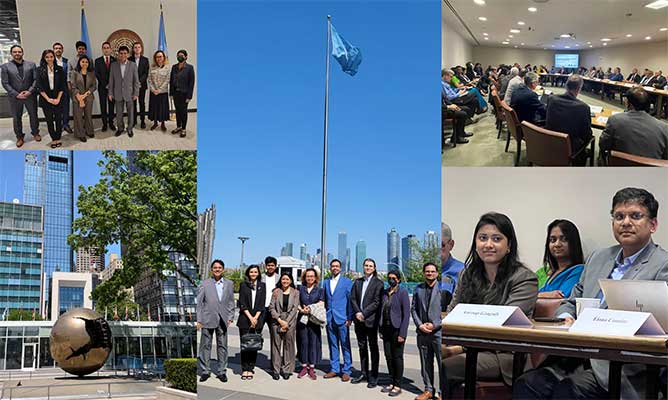Sustainability and Data Sciences Laboratory Invited to Present at United Nations HQ

The Sustainability and Data Sciences Laboratory (SDS Lab), led by Professor Auroop Ganguly in the Civil and Engineering Department at Northeastern University (NU), was invited to attend and present at an event on disaster risk reduction in the United Nations (UN) headquarters in New York City on May 17, 2023.
Organized by the International Coalition for Sustainable Infrastructure and the International Institute for Sustainable Development under the auspices of the United Nations Office for Disaster Risk Reduction (specifically, related to the SENDAI framework), the SDS Lab statements were on data-driven systems for climate resilience (specifically, what Ganguly has previously called a “convergence of complexities”) and disaster risk reduction from compound extremes. The topics presented by the SDS Lab included hybrid AI-physics methods and the relevance of Big and small data, as well as case studies in climate and weather in the US and across the world such as in India (e.g., a new SDS Lab project under the Monsoon Mission) and Indonesia. A case study in translational research by the SDS Lab was submitted which included US patents on climate risks and infrastructure resilience and socially impactful entrepreneurship in urban climate resilience for bond markets and AI-based satellite data-driven weather prediction for the renewable energy industry. Furthermore, research for Boston-area communities, such as those related to Climate Ready Boston (e.g., the BRAG report) and the Town of Brookline (Massachusetts) via the AGU Thriving Earth Exchange (specifically, on Health and Heat: see also, here), were briefly discussed.
The opening statement and presentation excerpts by the College of Engineering Distinguished Professor Auroop Ganguly, as well as a case study presentation by PhD candidate (and recent CEE teaching award winner) Puja Das, were recorded by incoming PhD student Aayushi Mishra and subsequently edited into a video by undergraduate student Aurrel Bhatia (who did not attend the event) and uploaded on YouTube by PhD student Ashis Pal. The international case study paper was authored by Das with PhD student Dian Indrawati, while a case study paper on translational R&D and socially impactful entrepreneurship was authored by GRI-funded postdoctoral researcher Rachindra Mawalagedara and PhD candidate (and recent COE research award winner) Jack Watson. The translational R&D paper was not presented but the contents were briefly discussed by Ganguly in his statement. The delegation was led by Ganguly, the PI of the SDS Lab, and besides the students and researchers mentioned above, included postdoctoral researchers Arnob Ray (funded by EAI) and Rishi Sahastrabuddhe. The nine participants from the SDS Lab represented five countries: Bangladesh, India, Indonesia, Sri Lanka, and the United States of America.
The event has been covered by Northeastern Global news: the photos therein were prepared by Mishra, Indrawati, and Ganguly, and together with the video links have been made open access by the SDS Lab. Professor Auroop Ganguly, who co-directs the Global Resilience Institute (GRI) and directs the AI for Climate and Sustainability (AI4CaS) focus area within the Institute for Experiential AI (EAI) at Northeastern University, believes the event relates to both the cross-college institutes at NU.
The SDS Lab PI Ganguly requested perspectives from representative attendees, which are reproduced below.
SDS Lab UN Visit: A Perspective from PhD students
Authors: Aayushi Mishra (incoming PhD student) and Jack Watson (PhD candidate)
The UN event on disaster risk reduction consisted of insightful presentations and discussions from a myriad of public and private sector experts and stakeholders, including U.S. governmental agencies like the Federal Emergency Management Agency (FEMA) and the Metropolitan Transportation Authority (MTA), academic institutions like Northeastern and Columbia University, and industry partners like AECOM and Arcadis.
From the keynote speech given by Mr. Abhilash Panda to the concluding statements, the theme of the discussions was evident: now more than ever, resilient infrastructure is a necessity. The presentations included perspectives on resiliency goals, disaster management plans, infrastructure life cycles, investments in pre-disaster mitigation, and more. The speakers highlighted the interdisciplinary nature of the roundtable and emphasized the need for such unique perspectives in mitigating disaster risks.
It was also inspiring to see the positivity on display despite the immense challenges our world is facing; the talks focused on quantifiable solutions, lessons learned, and the improvement of future plans. Overall, our group had an enjoyable experience learning from such an established group of subject matter experts.
SDS Lab UN Visit: A Perspective from Postdoctoral Researchers
Authors: Rachindra Mawalagedara (GRI Postdoc) and Arnob Ray (EAI Postdoc)
Resilience, an essential component in building a sustainable society, requires a multidisciplinary approach with successful collaborations across sectors. The event on disaster risk reduction at the United Nations headquarters in New York City was an excellent opportunity to see this in practice with the academic, government, and private sectors coming together to successfully discuss ideas and share solutions to disaster risk reduction. The expert views at this event were a well-balanced combination of science, policy, and societal needs. As researchers, we were heartened to see the emphasis placed on resilience solutions that do not further global warming and the focus on underrepresented groups and communities when looking for these solutions. We also found the willingness to share data and research across agencies, sectors, and national and international boundaries extremely encouraging for future research.
Related News: Can AI help reduce the risk of climate change disasters?, Northeastern Global News